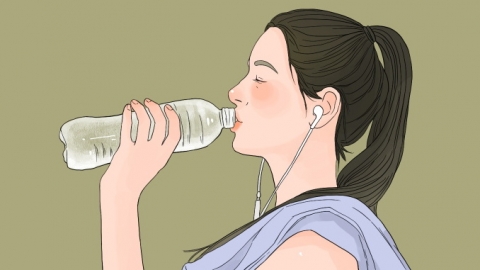What are the clinical manifestations of dehydration?
Generally, dehydration can trigger abnormal reactions across multiple body systems, mainly manifesting as thirst and dry mouth, reduced urine output with darker color, decreased skin elasticity, dizziness and fatigue, increased heart rate, etc. If experiencing any discomfort symptoms, it is recommended to seek timely diagnosis and treatment at a qualified hospital. Detailed analysis is as follows:
1. Thirst and Dry Mouth
When the body lacks water, the balance of body fluids is disrupted, leading to reduced secretion from oral mucosa and salivary glands, and decreased oral moisture. This results in a noticeable sensation of thirst, accompanied by dry mouth and tongue, dryness of the tongue and oral mucosa, and possible discomfort during swallowing. These are signals from the body indicating the need for prompt hydration.

2. Reduced Urine Output with Darker Color
Under normal circumstances, the kidneys maintain the body's fluid balance by regulating urine output. During dehydration, the kidneys conserve water by reducing urine production, resulting in significantly less urine than usual. At the same time, the concentration of metabolic waste in urine increases, causing the urine color to darken from a normal light yellow to a deeper tea-like or even soy sauce-like color in severe cases.
3. Decreased Skin Elasticity
Skin elasticity relies on the support of water in the subcutaneous tissue. During dehydration, subcutaneous moisture decreases, leading to reduced skin elasticity. Pinching the skin on the abdomen or inner arm and releasing it normally results in rapid skin recoil. However, in a dehydrated state, the skin recoils more slowly, sometimes taking several seconds to recover. Additionally, some individuals may notice dryness and lack of luster in their skin.
Body fluid deficiency can affect blood circulation, leading to insufficient blood and oxygen supply to the brain, which may cause dizziness and possibly visual darkening, especially noticeable upon sudden standing. Additionally, water plays a role in the body's energy metabolism. Dehydration reduces energy production, leaving muscles without sufficient energy supply, which can result in fatigue, limb weakness, and reduced physical endurance.
5. Increased Heart Rate
To compensate for reduced blood volume caused by dehydration, the heart increases its beating frequency to maintain normal blood circulation and organ perfusion, resulting in an increased heart rate. Feeling the pulse at the wrist reveals more beats than usual, and the pulse may become weak. In severe cases, it may be accompanied by a mild drop in blood pressure.
In addition, dehydration may also present with sunken eyes and irritability. It is important to replenish fluids in a timely manner according to activity level and weather changes, avoiding prolonged exposure to high-temperature environments or failure to drink water promptly after intense exercise to prevent dehydration.







